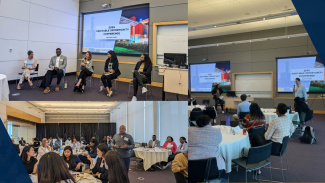Michigan Ross Faculty Host Equity Thought Leaders From Across the Country

The Ross School of Business recently hosted the Equitable Opportunity Conference. Over 90 academics, PhD students, and practitioners attended the conference, which showcased the latest academic research and insights on equity issues.
"Our goal was to bring together a cross-disciplinary group of leading academic scholars, students, and practitioners to explore research on equitable opportunities and generate ideas that will positively shape our society,” shared Carolyn Yoon, Wilbur K. Pierpont Collegiate Professor of Management and Associate Dean for Diversity, Equity, and Inclusion. “This conference creates a platform for dialogue and action that supports the school's vision of enhancing equity and economic inclusion across business and society."
Several Michigan Ross professors attended and participated in the event, including Lindy Greer, Michael R., and Mary Kay Hallman Fellow and professor of management and organizations. Greer serves as the Deputy Editor of Organization Science and explored strategies for publishing equity-focused research on a panel with editors from three other major business research publications.
"The Equitable Opportunity Conference provided a wonderful venue to discuss how we can conduct and leverage our research to help address inequity,” shared Greer. “I'm grateful to the organizers for convening an event to address this critically important societal problem!”
In addition to co-organizing the event, Chris Rider, Thomas C. Kinnear Professor and associate professor of entrepreneurial studies, shared research-backed insights on using equity analytics to meet organization-level goals. Rider explained that organizations should be thoughtful when distributing career opportunities or evaluating talent to mitigate inadvertently created inequities.
In his presentation, Rider showed how the equity analytics approach has been put to use in different situations to uncover the roots of unfairness. He spoke about how his framework assists leaders in finding and implementing strategies that are likely to tackle these underlying issues head-on. Meeting the “Equity Challenge” requires more than just identifying inequities but also finding effective ways to address and correct them.
What is equitable opportunity?
Rider defined “equitable opportunity” during his introduction of keynote speaker and renowned civil rights lawyer Cyrus Mehri.
“Equitable Opportunity focuses us on understanding and addressing situations where differential treatment or disparate impact generates an uneven distribution of opportunities and, more specifically, a distribution that violates our notions of fairness, of justice, of equity,” shared Rider. “Our hope is that by articulating and engaging with diverse, and often implicit, notions of fairness — even among those with interests and values similar enough to attend the same conference — we can explore the solution space for the DEI challenges we face.”
In his keynote speech, “Justice, Equity, Democracy, and Inclusion,” Cyrus Mehri discussed the impact of equitable opportunities. Mehri is known for his pivotal role in landmark cases that have redefined workplace discrimination laws. He continues to be instrumental in initiating major class action lawsuits, leading to significant reforms in corporate and public policy. For example, his work led to the adoption, implementation, and expansion of the Rooney Rule, which requires NFL teams to diversify hiring practices for leadership roles.
At the conference, Mehri explored the structures of democracy and showed how just and fair practices lead to increased achievement and excellence. He noted that to achieve excellence, leaders must be willing to challenge the status quo and face criticism.
Supporting the future of DEI
Diversity, equity, and inclusion are a major focus at Michigan Ross, with equity being one of the school’s key priority areas for developing thought leadership over the next few years. Part of this work includes supporting doctoral candidates and their research. To open the conference, a panel of Michigan Ross professors invited a group of nearly 20 doctoral students to learn about best practices, discuss their projects, and receive feedback. In attendance were a number of Michigan Ross doctoral students including Brenda Myung, Devin Kilpatrick, Kyle McCullers, Shonita Black, and Susie Choe.
Devin Kilpatrick, a rising third-year PhD candidate in management and organizations, participated in the PhD mentorship panel and presented his research, “Here To Work: An Examination of In-person Work Experiences In An Era of Hybrid Work.”
Kilpatrick shared that the conference highlighted the wealth of topics to explore in DEI research. He is particularly excited to see how future research explores challenges outside the key pillars of race, gender, and class to tackle topics such as cognitive diversity, access to technology, parental status, and more.
“One main takeaway I had from my interactions with other PhD students is the sheer ambition of my peers in terms of working to generate scholarship that solves real-world problems, shared Kilpatrick, “Rather than ‘playing it safe’ and aiming to make incremental intellectual contributions, many of my peers are dreaming big and trying to tackle the greatest societal challenges of our time. I hope to bring that same level of rigor and purpose to my work.”







